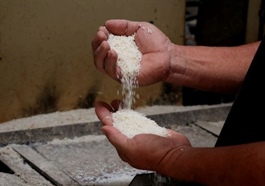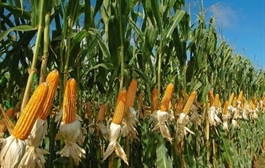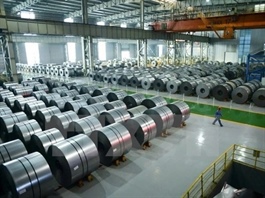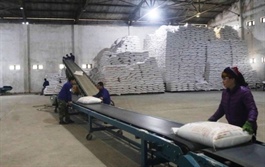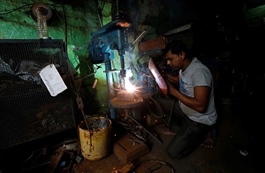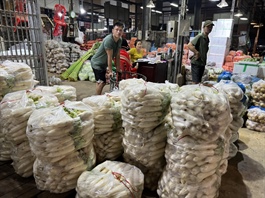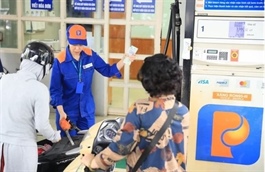Cement market continues to face difficulties
Cement market continues to face difficulties
It is forecast that there will be many difficulties for the cement industry, due to weak demand and fierce competition both domestically and internationally.
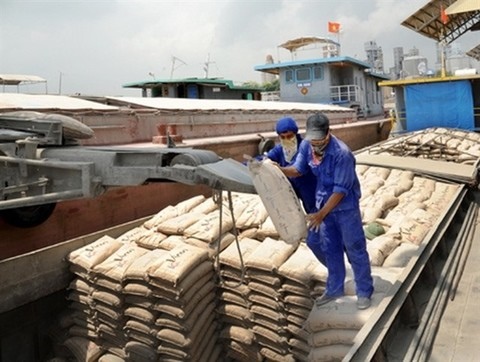
China, a key export market for the cement industry, reduced imports by 90 per cent last year, due to weak demand stemming from difficulties in the country's real estate sector.— Photo baoxaydung.com.vn |
According to the Việt Nam Cement Association, only 44,600 tonnes of cement and clinker were exported to the Chinese market in the first six months of this year, bringing in less than US$1.57 million in foreign currency, compared to more than $24 million the first half of last year.
China, a key export market for the cement industry, reduced imports by 90 per cent last year, due to weak demand stemming from difficulties in the country's real estate sector.
In addition, China's increased cement exports to Việt Nam's key markets have intensified price competition in those import markets.
Statistics on the export situation in the first half of this year show that the country exported 15.9 million tonnes of cement and clinker, earning nearly $612 million, up 0.1 per cent in volume but down 11 per cent in value year-on-year.
Even before facing challenges from current fluctuations in the Chinese market, the cement industry was already grappling with competitiveness issues.
Recently, the Trade Remedies Authority of Việt Nam under the Ministry of Industry and Trade received information that Taiwan (China) had officially initiated an anti-dumping investigation on cement and clinker originated from or imported from Việt Nam.
The authority said that the plaintiff named seven Vietnamese enterprises, in addition to other enterprises that also exported the investigated products to Taiwan.
The first half of the year painted a bleak picture for domestic cement companies, marked by weak demand, intense competition both domestically and internationally, and widely disparate profit margins.
Many enterprises were forced to halt kiln operations due to sluggish consumption or depressed product prices. Others adjusted kiln capacity and worker hours, even accepting reduced profits to minimize waste and ensure production efficiency.
Industry experts expressed skepticism about a robust recovery in the real estate market. Slow-moving projects faced delays or postponements due to challenges in securing capital and insufficient disbursement of public investment funds.
Furthermore, the scarcity and rising prices of construction materials, particularly sand, stone, and gravel, hampered construction progress in many areas, especially in the central and southwest regions, leading to a sharp decline in domestic cement demand.
Fuel supply and price are unstable at many times, affecting production and business results.
The use of alternative fuels and raw materials remains challenging, with no clear guidelines for utilising industrial waste as a substitute for traditional raw materials in production. The sharp decline in cement consumption has forced factories to adjust selling prices for certain product lines and specific projects, aligning them with fluctuating production costs to maintain operations.
The Government will develop a carbon emission market, putting even greater pressure on the cement industry.
Investors and consumers are increasingly demanding greener production practices, including the use of alternative fuels, waste heat recovery, and waste treatment. This trend is driving a shift towards increased reliance on alternative fuels over coal.
The Kinh tế & Đô thị (Economic and Urban Affairs) newspaper was told by a representative of the Việt Nam Cement Association, that the price of carbon credits in Europe is quite high, up to more than US$90 per tonne of CO2, so if taxed, this would be a very heavy burden for businesses.
Therefore, businesses need to take rapid green transformation solutions and be ready to cope with the tax, he said.
Green transformation in cement production involves reducing clinker content, minimising emissions during the clinker-burning process, or lowering electricity consumption throughout production.
However, reducing clinker content poses a significant challenge, as customers generally prefer cement with a higher clinker content. Therefore, the expert advises businesses to prioritise reducing emissions during the burning process or minimising electricity consumption during production.







